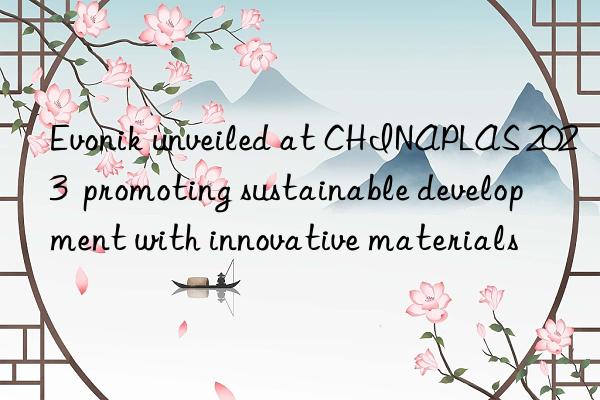
● Comprehensive display of sustainable solutions for the rubber and plastics industry
● Help the development of multiple strategic emerging industries such as new energy vehicles, green industry, and additive manufacturing
● CHINAPLAS 2023 will be held at Shenzhen World Exhibition and Convention Center from April 17th to 20th. Evonik booth: D87, Hall 17
Evonik, the world's leading specialty chemicals company, will exhibit at CHINAPLAS At Chinaplas 2023, it will showcase its latest sustainable polymer and additive solutions for the rubber and plastic industry. Related products can effectively improve the performance and sustainable benefits of end applications.
With the advancement of China's "dual carbon" goals, sustainable development has become the development direction of many industries, and the market demand for environmentally friendly, energy-saving, and low-carbon solutions continues to rise.
"Evonik has fully incorporated sustainable development into its corporate strategy and made it a core driving force for innovation." said Xia Fuliang, President of Evonik Greater China, "We are constantly developing 'next-generation solutions' with significant sustainable advantages. , to strengthen the sustainable product portfolio; by optimizing the production process, we continue to reduce the carbon footprint of the production process and products. At this exhibition, many innovative products and sustainable solutions will be gathered on the scene, which not only demonstrates Evonik's strong innovation Its strength also reflects the company's active contribution to China's sustainable development under the green transformation."
During CHINAPLAS, Evonik will showcase its wide range of product portfolios and expertise through five sectors: Smart Transportation, Green Industry, Additive Manufacturing, Healthy Life, and Plastic Recycling, with the theme of "Beyond Chemical Boundaries, Innovative Materials for Sustainable Development" ability.
Material solutions specially developed for the new energy vehicle market
- by VESTAMID® Compared with traditional metal or rubber pipes, the cooling pipe made of PA12 reduces the thickness of the pipe wall, which can effectively reduce the weight of the car and increase the design space, especially the design of the pipes in the battery pack, thereby indirectly increasing the number of batteries and improving the performance of electric vehicles. recharge mileage. In addition, it has excellent low temperature impact resistance.
- by VESTAMID® High-voltage electrical busbars made of PA12 can meet almost all UL fire ratings, including V0 ratings. Its excellent performance has been recognized by automobile OEMs and suppliers.
- ACCUREL® DS series solid silane masterbatches can be used to modify electric vehicle cable materials, improve mechanical properties, increase heat distortion temperature and heat setting performance, improve moisture resistance and corrosion resistance, and improve electrical properties.
- by VESTAMID® The multilayer hydrogen delivery pipe made of PA12 has excellent low precipitation, low permeability and low temperature impact resistance; at the same time, it can realize electrical conductivity, making the hydrogen delivery pipeline system of hydrogen energy vehicles safer.
High-performance material solutions for green industrial applications
- SEPURAN® membrane can be used for the separation and purification of methane, nitrogen, hydrogen and other gases. Evonik SEPURAN® N2 separation membrane can efficiently purify nitrogen in the air; SEPURAN® Noble membranes can selectively extract and recover high-concentration hydrogen from natural gas pipelines transporting methane-hydrogen mixtures; SEPURAN® NG membranes can efficiently separate and recover carbon dioxide from natural gas with high carbon dioxide content.
- VESTAMID® NRG PA12 is a polyamide material specially developed for large-scale pipeline applications. It can withstand harsh onshore and offshore environmental tests, and provides safe and reliable transportation solutions for oil, natural gas, hydrogen and other fluids.
Comprehensive portfolio of additive manufacturing materials
- Evonik's 3D printing brand INFINAM® covers a rich portfolio of ready-to-use high-performance polymer products such as nylon powder (PA12, PA613), nylon elastomer (TPA, TPC), photosensitive resin, polyether ether ketone filament, etc., suitable for All mainstream 3D printing technologies help additive manufacturing technology achieve sustainable large-scale application.
- Resins such as nano-silica particle composite resins (Nanopox®, Nanocryl®), silicone rubber modified composite resins (Albidur®) and acrylic polyurethane block copolymers (ALBIFLEX®) are suitable for various 3D printing technologies.
Sustainable high-performance polymers from renewable raw materials
- New sustainable high-performance plastic VESTAMID® eCO Produced using renewable energy, the E40 uses 50% of its raw materials from recycled tires, reducing its carbon footprint by nearly 42% compared to conventional products. VESTAMID® eCO E40 can be used to manufacture midsole or outsole foam materials of various grades of sports shoes, endowing them with excellent cushioning performance and durability.
- TROGAMID® eCO is a high-purity microcrystalline high-performance polyamide optimized for the optics industry for the production of lenses and frames. The product not only uses bio-recyclable raw materials to replace fossil raw materials, but also only uses renewable energy in the granulation production, so that its carbon footprint in the entire life cycle is reduced by more than 50% compared with petrochemical products.
Process additives promote recycling of plastic products
- Evonik also provides green additives for plastic recycling and production of biodegradable plastics. TEGO Cycle®, TEGO Sorb® can be applied to multiple processes of plastic physical recycling, effectively solving problems such as label removal, ink removal, metal removal, defoaming, wetting, dehydration, and odor absorption; TEGOMER®, ACCUREL® XP can be used in the production process of PLA (polylactic acid), PBAT (polybutylene adipate terephthalate) and other biodegradable plastics, making the process more convenient.



 微信扫一扫打赏
微信扫一扫打赏
